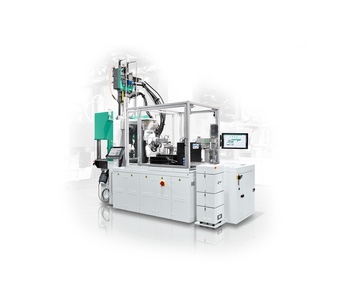Packaging
Digitalisation and automation hand in hand: efficient, traceable part production

Wednesday 02. October 2024 - At Fakuma 2024, Arburg (Halle A3, Stand 3101) will be demonstrating how digitalisation and automation work hand in hand to produce plastic parts efficiently and with 100 percent traceability and recyclability, using a turnkey system centred around a vertical Allrounder 375 V.
• Fully automated: a turnkey system with a hanging-mounted six-axis robot
• Compact: vertical Allrounder overmoulds inserts
• Seamless: ATCM for 100 percent traceable part quality and R-Cycle information
Vacuum housings are manufactured and installed in Multilift robotic systems. The accompanying six-axis robot is suspended and therefore requires very little space. The SCADA system Arburg Turnkey Control Module (ATCM) makes it possible to link material and process data. The fully automated application is also an application example of the R-Cycle initiative.
The compact turnkey system for the automated overmoulding of inserts and traceable part production is a sophisticated manufacturing solution with high autonomy. The consistent use of digitalisation solutions allows the individual process steps to be linked via a continuous data and information chain, enabling seamless tracking of part quality and output.
Space-saving automation
A vertical Allrounder 375 V with a clamping force of 500 kN is at the centre of the production cell, equipped with a single-cavity mould from Arburg. The hanging-mounted automation does require not any additional space. The six-axis robot first transfers two metal bushings, which are provided via vibratory conveyors, to the mould where they are overmoulded with glass-fibre-reinforced polyamide PA6 (GF30). The “aXw Control ReferencePilot” ensures homogeneous material preparation and consistently high product quality. This pilot function in the control system precisely regulates the pressure profile in the mould and compensates for fluctuations in viscosity. The cycle time is around 30 seconds, and the weight of the moulded part is 58.5 grams. After removal from the mould, the injection moulded parts are marked with two QR codes by a laser station for part-specific traceability and for reading R-Cycle information. The housings are finally discharged from the production cell via a conveyor belt.
100 percent traceable
The SCADA system ATCM is the key technology for linking and tracing material and process data. At the exhibit at Fakuma, the part-specific data from the injection moulding process and the automation will be collected and linked with the results of the visual inspection of the insert. The component ID ensures that each individual product is clearly identified and that the part quality is seamlessly documented.
On the other hand, the application is a practical example of R-Cycle and digital product passports: the ATCM passes on data relevant to processing and recycling over a defined production period during the manufacturing phase. This is done using a so-called GS1 barcode standard (in accordance with the German guideline “Circular Plastics Traceability”). R-Cycle enables standardised data exchange across company boundaries. The data is stored in digital product passports. In this way, information relevant to recycling can be viewed and utilised across the entire value chain, e.g. by subsequent processors, end users and recycling companies. This forms the basis for recyclable processes and the best possible reuse.
